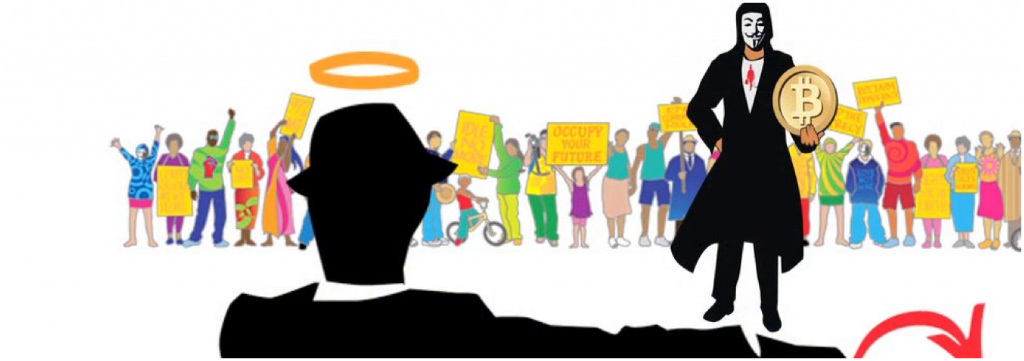This article first appeared on page 26 of Issue 21.
You probably don’t think about Marxism when you think about Bitcoin. To most people, Marx is known as the guy who didn’t like private property and capitalism in general. Bitcoin, a cryptocurrency with the ability to encourage markets by breaking down the worldwide barriers created by multiple national currencies, doesn’t seem like it has much to do with him. You would probably think that Marx wouldn’t like Bitcoin.
But I don’t think so. I believe if Marx were around today he would see Bitcoin as an excellent example of his Theory of History in action; a global system, with roots in the crisis’ of capitalism, that will bring the world closer to his utopian ideals.
What many people don’t know about Marx is that he admired capitalism as a creator of wealth. While he despised the way that it abused the labor of the proletariat (working class), he saw it as a necessary period on the way to socialism and, eventually, communism. He believed in historical materialism, the idea that society is shaped by physical conditions at certain points in history. These physical conditions create an environment for revolutionary changes in human society.
If this seems confusing, the best analogy I can draw is with Darwin’s theory of evolution. Much like The Origin of the Species sought to explain how biological creatures change over time as a result of their environment, Marx sought to explain the process behind humanity’s economic evolution. Marx admired the work of Darwin and thought that his (Darwin’s) work created a foundation that he could build on. From his letters:
Darwin’s work is most important and suits my purpose in that it provides a basis in natural science for the historical class struggle. One does, of course, have to put up with the clumsy English style of argument. Despite all shortcomings, it is here that, for the first time, ‘teleology’ in natural science is not only dealt a mortal blow but its rational meaning is empirically explained.
Marx’s history of class struggle outlines 6 stages of history, each one creating the foundation for the next. They are: primitive communism, slave society, feudalism, capitalism, socialism, and communism.
So how does all this tie into Bitcoin?
I think there is an interesting parallel between how Marx describes the transition from capitalism to socialism and what we are seeing today with the adoption of Bitcoin. As I said before, Marx believed that capitalism was a fantastic tool for increasing production and development. You can attack his beliefs as much as you want (and there is plenty to criticize in his writing) but there is no denying that Marx was brilliant when it came to forecasting the consequences of trade. From The Communist Manifesto:
Modern industry has established the world market, for which the discovery of America paved the way. This market has given an immense development to commerce, to navigation, to communication by land…as industry, commerce, navigation, railways extended, in the same proportion the bourgeoisie developed, (and) increased its capital.
Keep in mind that this man is writing in 1848, a time when the “world market” barely existed. Marx carries the consequences of the global spread of capitalism to what he believed to be their logical conclusion:
In place of the old local and national seclusion and self-sufficiency, we have intercourse in every direction, universal inter-dependence of nations. And as in material, so also in intellectual production. The intellectual creations of individual nations become common property. National one-sidedness and narrow-mindedness become more and more impossible, and from the numerous national and local literatures there arises a world literature.
Marx never explicitly outlines how capitalism becomes socialism. Nor does he give a timeline for when it will happen (though he hoped it would happen during his lifetime). All that he leaves readers with is his certainty that this revolution will happen and that it will occur at a time when capitalism has spread across the entire globe threatening the clarity of national boundaries and ownership of intellectual creations.
A time much like today.
Viewed through this Marxist lense Bitcoin becomes a product of its time in world history. This helps to answer what I believe to be the most fascinating question surrounding the phenomenon: why is Bitcoin working at all?
While there are obvious real world uses for Bitcoin, only the most ardent supporters of the protocol will claim that the technology in its current state is the best option for conducting everyday transactions. Buying products with BTC can be clumsy and time consuming. Prices change by the minute. Conversion to fiat (which is needed to pay taxes or buy goods and services not offered in BTC) can be burdensome. Secure storage is a vexing process for those who are not computer savvy. Convenient storage is risky.
So why has there been a steadily increasing rate of adoption?
My hypothesis is that people around the world are excited about Bitcoin because of the promise that it holds as an alternative to the existing economic and political structure. To many users, Bitcoin isn’t just an alternative currency or money transferring system. It is a representation of their distaste with the world economy we are living in.
Recently there have been arguments that the Bitcoin community is a “rich, white, male disaster”. While there is truth to this statement, it is also an editorialized simplification. A more measured analysis of the data reveals a different conclusion. From the blog Simulacrum (which the HuffPo article used as the source for its data):
The results so far from the 2014 community survey suggest the community is now only about one quarter libertarian, matched by a quarter liberal, and a quarter more left-wing, with a few smaller groups of other political identities. When asked to choose a political label, we get responses from all four quadrants of the political compass.
And when discussing the idea that Bitcoiners are wealthy:
On the contrary, during my ethnographic research a far more common background story is one of precarious living arrangements, economic uncertainty, and limited opportunities. Bitcoiners rarely talk about how many bitcoins they have, instead focusing on when they first heard about it, when they first got involved, and how they feel about the project. They do not talk about their stash as an asset, but rather as a shared interest. When the cruder financial implications are discussed, they are usually framed in terms of empowerment and escape, the plans for buying a house, raising a family, or gaining the economic freedom to focus on some other project.
Far from the elites suggested in the Huffington Post article, Simulacrum paints a picture of the average Bitcoin user as an everyman frustrated by what Marx would describe as the (again from the Manifesto) “uninterrupted disturbance of all social conditions, everlasting uncertainty and agitation” that distinguishes our modern “bourgeois epoch”. These people are not attracted to Bitcoin because they want to buy drugs or get rich quick. They are human beings frustrated with the instability of our modern society captivated by a system that just might offer hope for a better way.
This mentality can be traced back to the very inception of Bitcoin. While Satoshi never actually outlines his mission for this technology in the White Paper, there are clues to what he wanted to accomplish with his/her/their creation. Consider the note embedded in the Genesis Block:
Jan. 3, 2009: The Times 03/Jan/2009 Chancellor on brink of second bailout for banks.
The 2008 worldwide collapse was a monumental failure by the financial sector and the governments that oversee them that ended up having global consequences, consequences that hurt the financially vulnerable people of the world more than anyone else. Economists decided the best course of action to fix this situation was a bailout for banks, the same institutions that helped cause the crisis. Judging by the Genesis Block note, Satoshi took issue with this solution and he viewed the cryptographic reliability of Bitcoin as a tool to stop this reliance on flawed human agency.
Satoshi had political motives as well. While he did not see Bitcoin as a necessary and sufficient tool for creating a better world, he believed it was a start. From the Cryptography Mailing List:
Yes, (we will not find a solution to political problems in cryptography), but we can win a major battle in the arms race and gain a new territory of freedom for several years. Governments are good at cutting off the heads of centrally controlled networks like Napster, but pure P2P networks like Gnutella and Tor seem to be holding their own.
And here, again, we come back to Marx. If Bitcoin does end up becoming part of a larger global revolution, its decentralized nature is exactly what Marx predicted. He did not believe in the proletariat’s ability to organize themselves effectively. From Phillip Gasper’s The Communist Manifesto: A Road Map To History’s Most Important Political Document:
Marx and Engels (his co-writer) never speculated on the detailed organization of a future socialist or communist society. The key task for them was building a movement to overthrow capitalism. If and when that movement was successful, it would be up to the members of the new society to decide democratically how it was to be organized, in the concrete historical circumstances in which they found themselves.
And so the Bitcoin economy finds itself five years into this social experiment, with no central authority or backing, but nonetheless a growing global community guided by nothing but the collective belief that there is a better way for the world to go about the ordinary business of life. Should it succeed in changing the way we all interact, historians and economists could be forced to reevaluate their criticisms of a man that long ago predicted the evolution of human trade.
The post Bitcoin and Marx’s Theory of History appeared first on Bitcoin Magazine.














